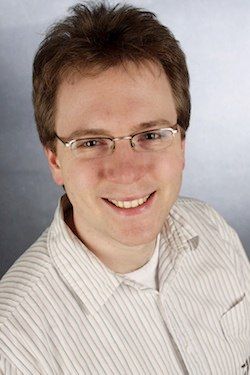
Blogging is a great way to report from a scientific conference. This could be done either with regular blog posts written in the evening or after the conference, and/or live-blogging using tools such as Friendfeed or Twitter.

Blogging is a great way to report from a scientific conference. This could be done either with regular blog posts written in the evening or after the conference, and/or live-blogging using tools such as Friendfeed or Twitter.
The final guest post by Alex Knoll reporting from the German Genetics Society Meeting in Cologne. Session V Friday ended with two talks in session V, the first by Tony Hyman from the Max Planck Institute for Cell Biology and Genetics in Dresden. He looked at the ways that cells structure and organize their cytoplasm by comparison with non-biological systems.
Another guest post by Alex Knoll reporting from the German Genetics Society Meeting in Cologne. Saturday had two more sessions before the end of the meeting. Irina Stancheva from the Wellcome Trust Centre for Cell Biology at the University of Edinburgh started us into the day with a talk on epigenetics in mouse development. One form of epigenetic silencing is methylation of cytosine bases in DNA.
Another guest post by Alex Knoll reporting from the German Genetics Society Meeting in Cologne. The last session on Thursday was split into two talks by Philippe Sansonetti from the Institute Pasteur in Paris and Julian Parkhill from the Sanger Institute in Hinxton, Great Britain. Both talked about pathogenic microbes, but from a different perspective.
Another guest post by Alex Knoll reporting from the German Genetics Society Meeting in Cologne. As promised, I attended the second Plant Genetics session of the meeting, thus missing the Epigenetics session. I learned an important lesson at the first talk by Juliette de Meaux from the Max Planck Institute for Plant Breeding Research: Bring sweets for the audience, and you have everyone on your side!
Another guest post by Alex Knoll reporting from the German Genetics Society Meeting in Cologne. Both sessions had some interesting talks, so it was really hard to decide between attending Cellular Genetic Mechanisms or Human Genetics, but in the end I went to the former. The first talk by Marina Rodnina from the Max Planck Institute for Biophysical Chemistry is not easy to put into words.
Another guest post by Alex Knoll reporting from the German Genetics Society Meeting in Cologne. The first session on Friday started with a talk by Frauke Melchior from the ZMBP in Heidelberg on SUMO. Apart from being interesting to work with, it also is good for some rather funny paper titles At the start, she gave a short introduction on the proterties of SUMO.
Another guest post by Alex Knoll reporting from the German Genetics Society Meeting in Cologne. Just after lunch the next decision: Neurogenetics or Evolution? Here I went with the topic that is less far from my field, and attended the evolution session.
Another guest post by Alex Knoll reporting from the German Genetics Society Meeting in Cologne. This time I had to decide between two parallel sessions for the first time at this meeting. Plant genetics or Development? Coming from plant molecular genetics myself, there perhaps was a ready-made decision, but I decided otherwise.
Another guest post from Alex Knoll reporting from the German Genetics Conference in Cologne. Dusko Ehrlich fom Jouy en Josas in France started off the second session of the meeting. He is working with the MetaHIT project, which tries to do a metagenomic analysis of the human intestinal tract.